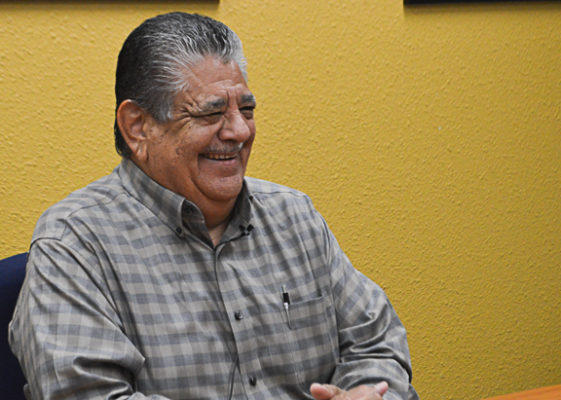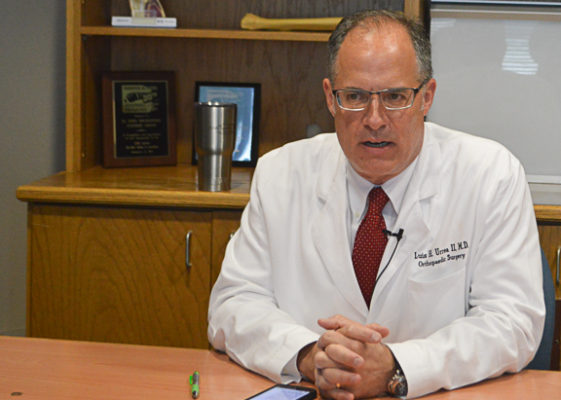By Angelina Steel
El Paso has substantially less than the doctors it needs for a city its size, limiting patient’s choices for specialists and lengthening waiting times for patients as doctors are accepting jobs in higher-paying markets, two medical professionals said.
“El Paso has 128 physicians per 100,000 per capita.” said Dr. Luis Urrea, an orthopedic surgeon. “The state level is 184 doctors per 100,000 per capita. That gives you an idea on how far we’re behind. The national is 208.”
The United States is expected to be short 122,000 physicians by 2013, according to a recent study.
“Right now we have about 24 providers. We’re short about two providers. We could use a couple of more. In fact we just lost another dentist,” said Robert Gonzales, chief operating officer of Centro de Salud Familiar La Fe Inc.

Robert Gonzales, chief operating officer at Centro de Salud Familiar La Fe Inc, smiles as he explains his job.
One reason behind these staggering statistics is that the city can’t compete with larger cities that have higher salaries, Urrea said. Physicians in El Paso can make up to $342,000 annually, according to ZipRecruiter.com, but Dallas physicians can make up to $402,000.
Additionally, potential recruits sometimes believe El Paso is not a safe city because of violence across the border. However, El Paso is ranked the second safest city in the nation according to Austin’s KVUE. El Paso’s border city – Ciudad Juarez – is ranked the fifth most dangerous city in the world, according to the Washington Post.
Juarez, Mexico, with a population of 1.3 million, and El Paso with about 800,000, makes it by the biggest border area in Texas.

Luis Urrea an Orthopedic Surgery surgeon at El Paso Orthopaedic surgery group, discusses the shortage of doctors in El Paso.
“It’s difficult to recruit people here on the border, particularly the last 10 years or so with the things that have occurred in Mexico, and the stories that you hear today,” Urrea said.
“This is the biggest border area there is,” he said. “El Paso and Juarez are bigger than anything else in Texas. So a lot of our problems are expanded because of our size, and Juarez’s size.”
Some doctors are signing contracts to work in El Paso, and back out at the last minute, Gonzales said. “The issue of moving to the border has become a problem. We had one guy that signed a contract once,” Urrea said, and the doctor backed out shortly before he was scheduled to start.
“Then he got married and his wife said ‘I’m not going there. We’re not going there.’ Because she heard about what’s going on in Juarez. Politicians always talk about how dangerous it is, but the truth is we’re the second safest city in the nation. I’ve always been safe here.”
With the shortage of doctors, it becomes harder for patients to see doctors. Lines become longer, and it becomes harder to find a specialist that they’re in need of. They may have to go to another city to see a specialist, Urrea said.
Gonzales said: “We see people here at La Fe that have such chronic diseases that are hard to treat because there may not only be one issue that they have. They might have high blood pressure, with obesity, with diabetes. Those are chronic conditions that all need to be addressed separately. So it does make it difficult.”
In addition to patients being widely affected, doctors are impacted by this concern as well.
“If you’re a PCP (primary care physician) it’s a little more difficult to find somebody who’s a specialist to take care of your patients in a timely manner.” Urrea said. “It’s overwhelming the amount of people that need to be seen. It’s also a silver lining because there’s a lot of people that need to be taken care of. Which is what I signed up to do. But it does make it more difficult.”
Officials at Centro de Salud Familiar La Fe, and Texas Tech are utilizing more physician assistants and registered nurses who can see patients on their own.
“The recruitment of our providers is a tough deal to address. We work with Texas Tech to establish a core of providers here in the border area. Because we have different issues than what Dallas, or Austin might have,” Gonzales said.
This story was produced as part of the Journalism in July 2019 workshop for high school students at UT El Paso.

